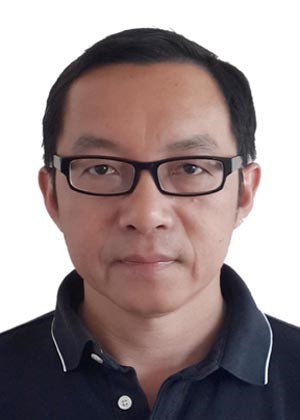
|
姓名 |
胡勤学 |
性别 |
男 |
职务 |
无 |
职称 |
研究员 |
学历 |
博士研究生 |
通讯地址 |
中国科学院武汉病毒研究所308室 |
电话 |
027-87199992 |
邮编 |
430071 |
传真 |
027-87199992 |
电子邮件 |
qhu@wh.iov.cn |
教育经历
2000.06-2003.05:英国伦敦大学, 病毒免疫学博士
1987.09-1990.06:中国科学院武汉病毒研究所, 病毒学硕士
1983.09-1987.06:湖南师范大学, 生物学学士
工作经历
2009.01-至今:中国科学院武汉病毒研究所,研究员
2000.06-2008.12:Institute for Infection and Immunity, St George's, University of London,UK, Research Fellow; Senior Lecturer
2000.03-2000.05:中国科学院武汉病毒研究所,副研究员
1997.03-2000.02:Brown Cancer Centre, University of Louisville, USA, Research Associate
1990.07-1997.02:中国科学院武汉病毒研究所,助理研究员
研究内容
以黏膜传播病毒为研究对象,聚焦病毒早期黏膜感染、免疫和生物阻断策略。探究黏膜性传播病毒HIV-1和HSV-2感染和免疫逃逸机制,设计和评价不同策略阻断病毒黏膜感染的效果,建立靶向诱导生殖道黏膜免疫应答策略;将以上方法和策略推广到经其它黏膜途径传播的病毒如HuNoV和AdV-3/7等。
针对新发/突发病毒如黄病毒等,从分子、细胞和个体水平研究病毒早期感染机制,研发针对病毒早期感染和传播的新型抗病毒策略如黏膜疫苗和RNA疫苗等。
主持项目
1. 国家自然科学基金,HSV-2极早期蛋白ICP27抑制IFN-β产生的机制及其对HIV-1黏膜共感染的影响研究,2018.01-2021.12,67.2万,主持。
2. 国家重大科技专项,基序表位用于突发传染病快速诊断POCT和治疗抗体的研发,2018.01-2020.1,381.32万,子课题主持。
3. 国家自然科学基金,HSV-2调控CXCL9、CXCL10和CXCL11的表达机制及对HIV-1黏膜共感染的影响研究,2016.01-2019.12,72万,主持。
4. 国家自然科学基金,整合素分子α4β7与gp120相互作用介导淋巴细胞定向迁移的机制及与HIV-1易感性的相关性研究,2013.01-2016.12,70万,主持。
5. 国家重大科技专项,基于新思路的艾滋病疫苗的临床前研究,2013.01-2015.12,84万,任务主持。
6. 国家重大科技专项,艾滋病临床干预的生物新靶点研究,2012.01-2015.12,80万,任务主持。
7. 国家973计划,重要病毒的入侵机制研究,2010.01-2014.08,290.42万(项目2033万),首席科学家。
8. 英中合作项目Hotung Trust,HIV传播与预防,2008.07-2014.12,10.74万英镑,主持。
成果
1. ZhengZ, Yang J, Jiang X, Liu Y, Zhang X, Li M, Zhang M, Fu M, Hu K, Wang H, Luo MH,Gong P, Hu Q. Tick-borneencephalitis virus nonstructural protein NS5 induces RANTES expressiondependent on the RNA-dependent RNA polymerase activity. J Immunol. 2018, 201(1):53-68.
2. Hu K,Fu M, Guan X, Zhang D, Deng X, Xiao Y, Chen R, Liu H, Hu Q. Penton base induces better protective immune responses thanfiber and hexon as a subunit vaccine candidate against adenoviruses. Vaccine.2018, 36(29):4287-97.
3. Yan Y,Hu K, Deng X, Guang X, Luo S, Tong L, Du T, Fu M, Zhang M, Liu Y, Hu Q. Immunization with CCL19-HSV-2 gBfusion constructs protects mice against lethal vaginal challenge. JImmunol. 2015, 195(1):329-38. (Patent:ZL 201410132066.6)
4. Li C,Guan X, Du T, Jin W, Wu B, Liu Y, Wang P, Hu B, Griffin G, Shattock R, Hu Q. Inhibition of HIV-1 infection ofprimary CD4+ T cells by gene editing of CCR5 using adenovirus-deliveredCRISPR/Cas9. J Gen Virol. 2015, 96(8): 2381-93. (With high citation)(Patent:ZL201510134503.2)
5. ZhangM, Liu Y, Wang P, Guan X, He S, Luo S, Li C, Hu K, Jin W, Du T, Yan Y, Zheng Z,Zheng Z, Wang H, Hu Q. HSV-2immediate-early protein US1 inhibits IFN-β production by suppressingassociation of IRF-3 with IFN-β promoter. J Immunol. 2015, 194(7): 3102-15.
6. Hu K, LuoS, Tong L, Huang X, Jing W, Huang W, Du T, Yan Y, He S, Griffin G, Shattock R, Hu Q. CCL19 and CCL28 augment mucosaland systemic immune responses to HIV-1 gp140 by mobilizing responsiveimmunocytes into secondary lymph nodes and mucosal tissue. J Immunol. 2013,191:1935-47. (Cover story)
7. Du T,Hu K, Yang J, Jing J, Li C, Stieh D, Griffin G, Shattock R, Hu Q. Bifunctional CD4-DC-SIGN fusionproteins demonstrate enhanced avidity to gp120 and inhibit HIV-1 infection anddissemination. Antimicrob Agents Chemother. 2012, 56(9):4640-9. (PatentZL201110030466.2)
8. HuangW, Hu K, Luo S, Zhang M, Li C, Jin W, Liu Y, Grifing G, Shattock R, Hu Q. HSV-2 infection of humanepithelial cells induces CXCL9 expression and CD4+ T cell migration viaactivation of p38-C/EBP-β pathway. J Immunol. 2012, 188(12):6247-57. (Recommended by Faculty of 1000 Medicine)
PubMed: Clickhere for PubMed search for Qinxue Hu